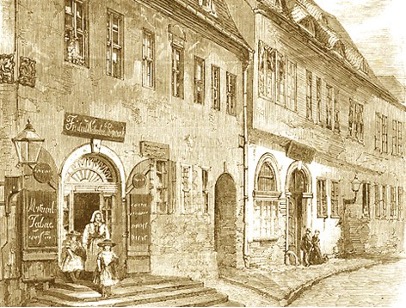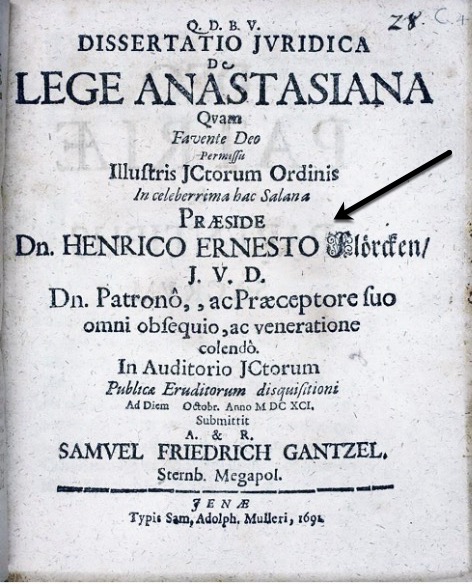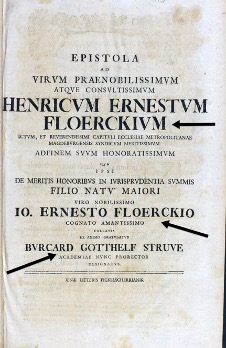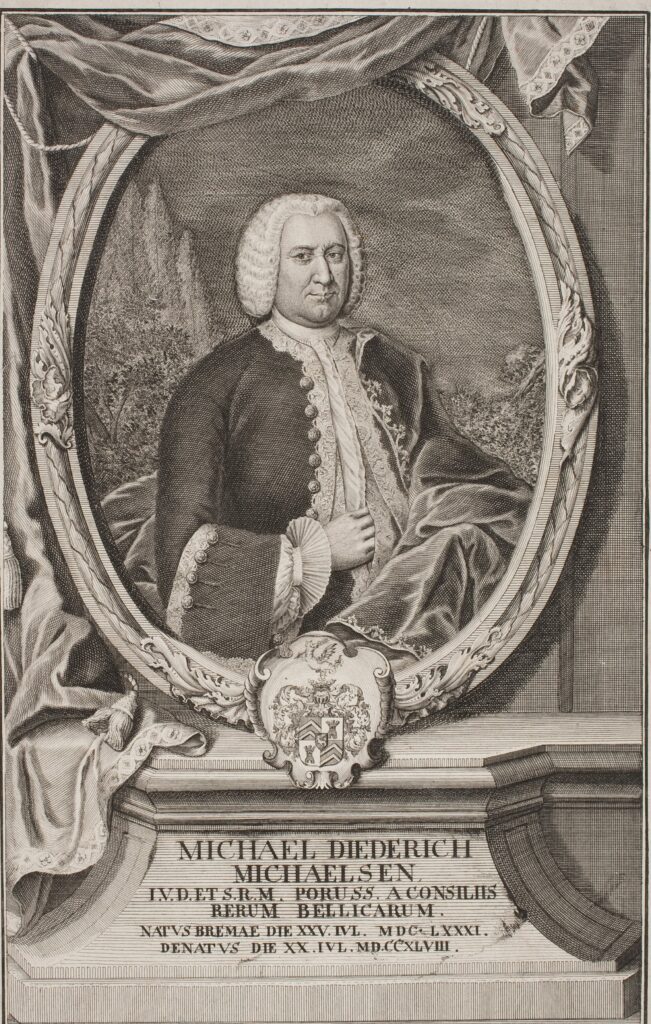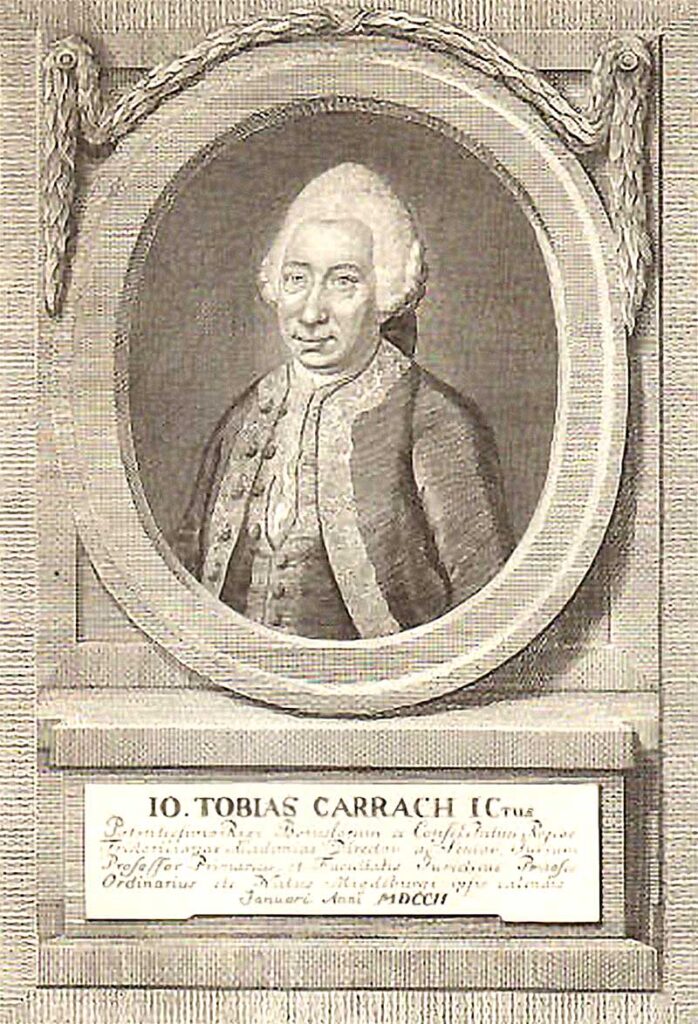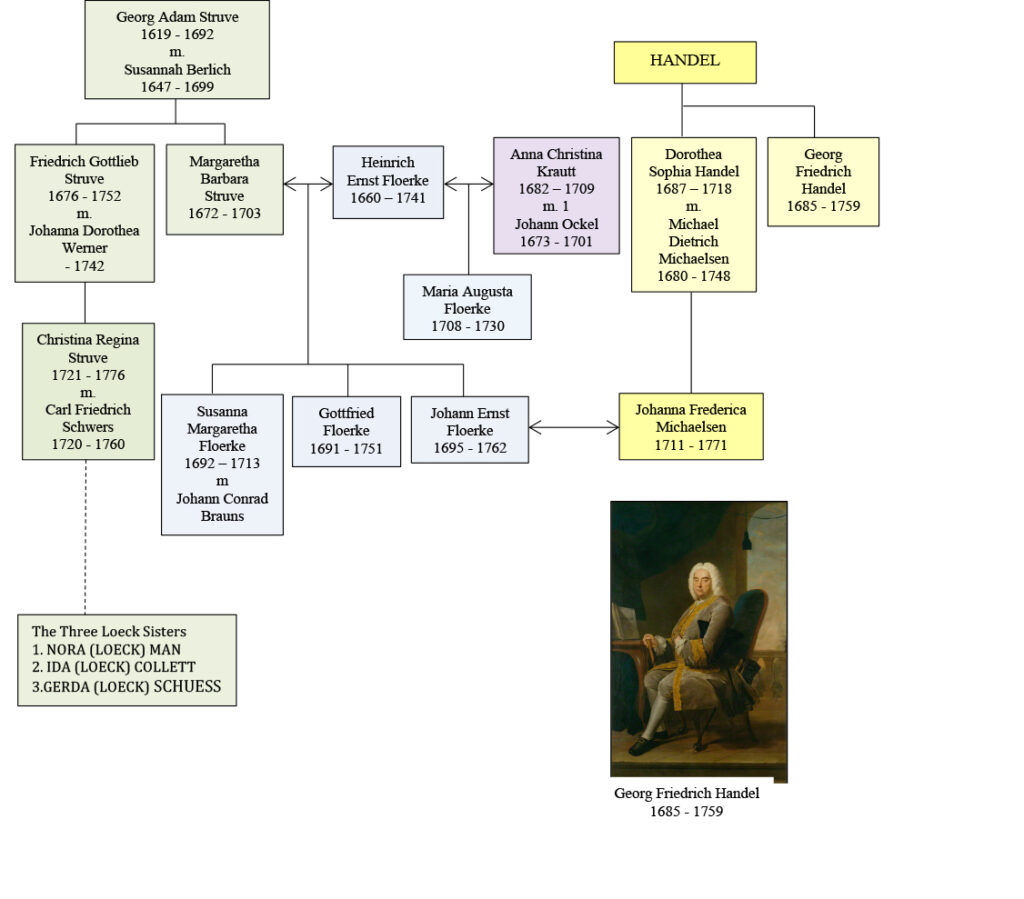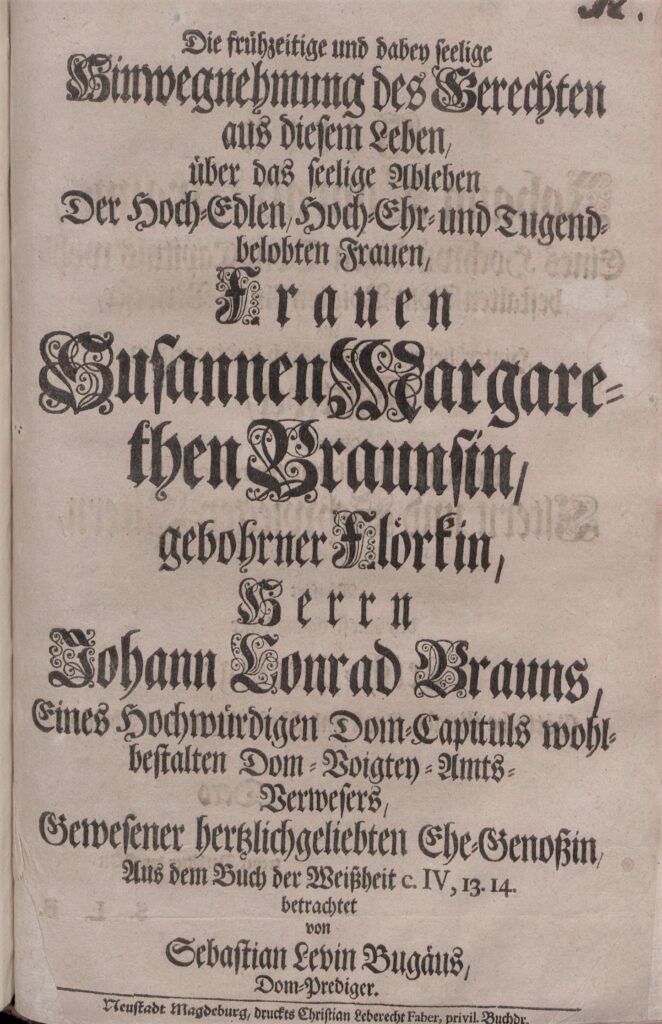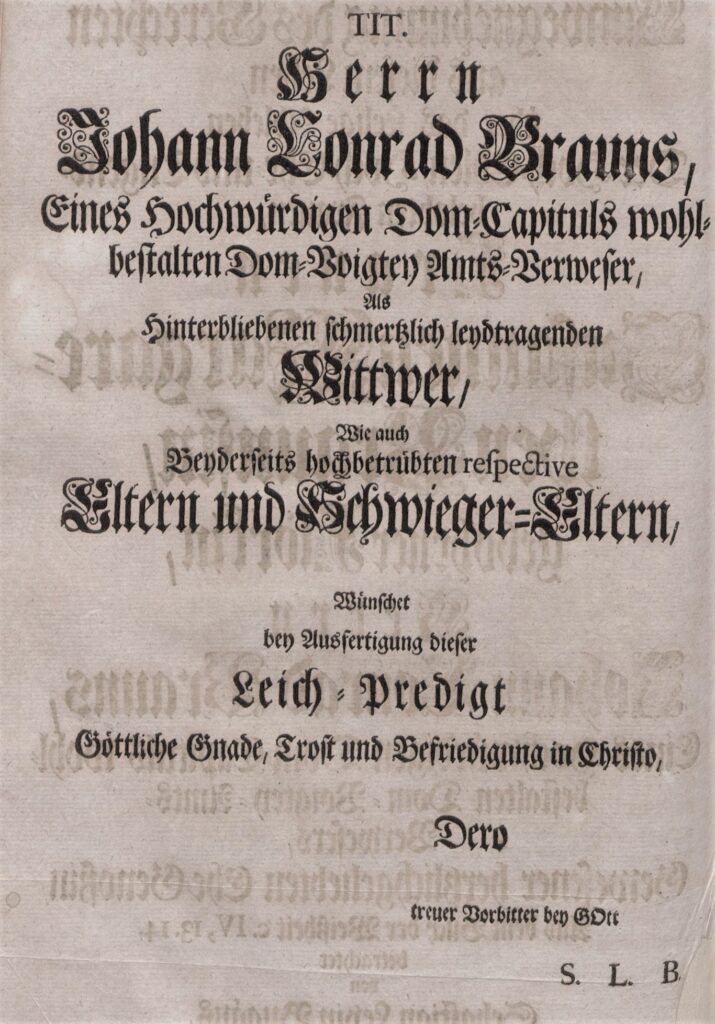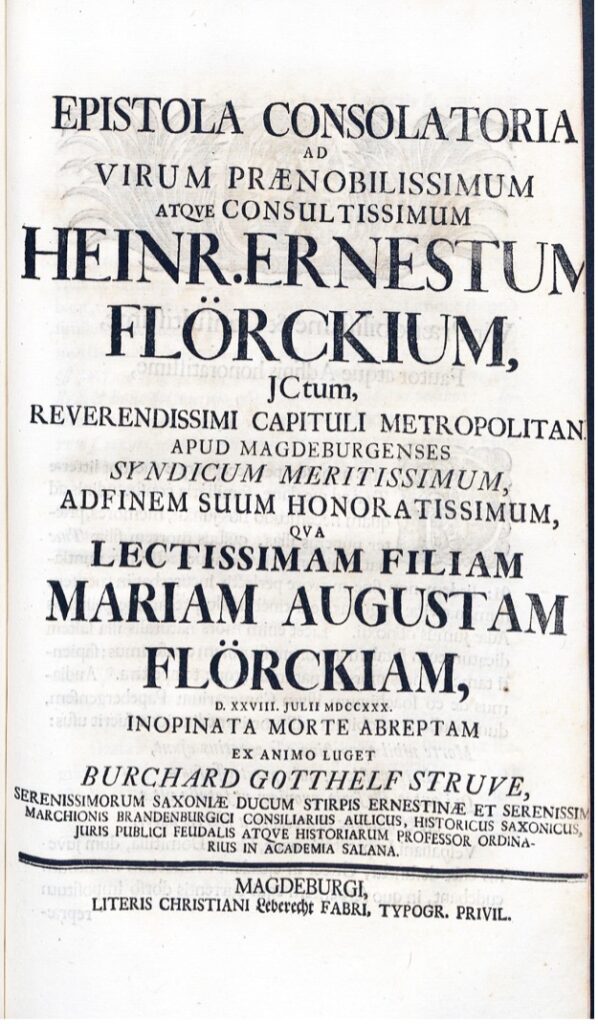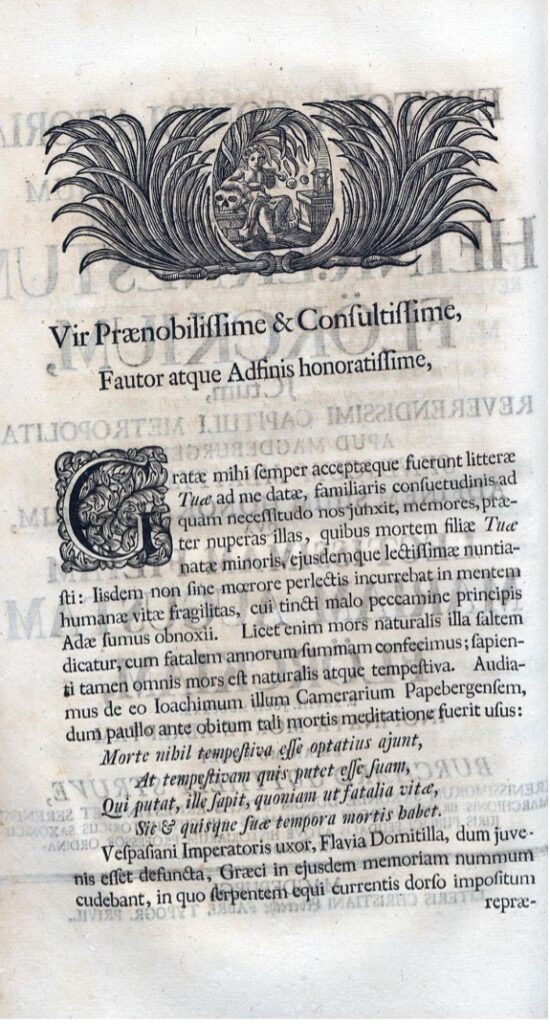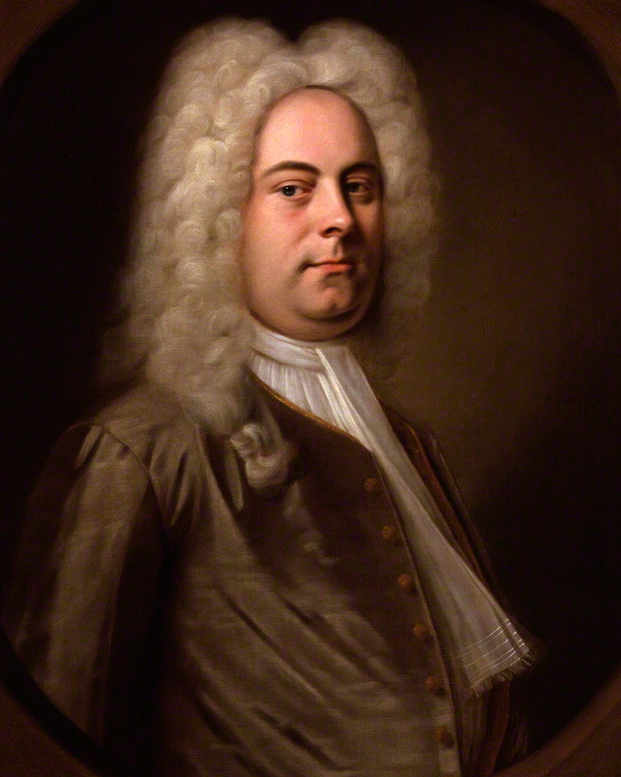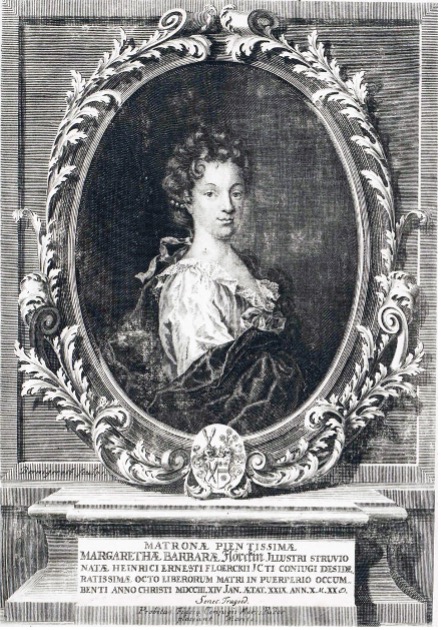
Margaretha Barbara Struve (1672 – 1703) was the daughter of Georg Adam and Susanna (Berlich) Struve. She was probably named after each of her grandmothers: Anna Margaretha (Brunner) Struve and Barbara (Hilliger) Berlich. She married Heinrich Ernst Flörcke (1660 – 1741) an associate lawyer at Hofgericht in Jena. .
On the GEAC catalog there are three funeral sermons in Margaretha Barbara’s honor. For example, her brothers Burchard Gotthelf and Friedrich Gottlieb Struve as well as Michael Zulich published: Das Grabmahl aller Frommen, wie es Esaiæ LVII. V. 1. & 2. Von Gott dem Herrn selber aufgerichtet, und bey Hochansehnlicher Leichbegängniß Der … Frauen Margarethen Barbaren Flörckin geb. Struvin, des … Herrn Heinrich Ernst Flörckens … (not yet digitized) [Upon the passing of the woman Margarethe Barbara Flörck born Struve, wife of … Mr. Heinrich Ernst Flörck J.V. very famous Doctor, and Court Advocate in Ordinary at the Hochfürstl Court who died on the 14th of January of the year 1703 and on the 8th was brought to her grave in the Collegiate Church.]
Heinrich Ernst Flörck was awarded his doctorate by the university at Jena with the title: Purpuram Doctoris Iuridici Ab Illustri Iure Consultorum Ordine Viro … Ioanni Ernesto Floerckio Solemni Ritu Digne Collatam Tenui Quidem Epistola Laetantibus Tamen
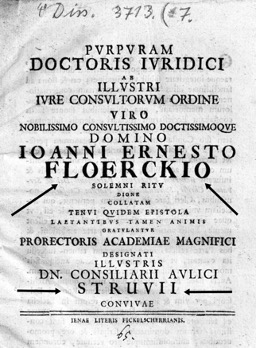
Like many who married into the Struve family, Floerke found himself co-authoring works with his in laws. For example, Jurisprudenz, oder Verfassung derer Landüblichen Rechte … which included Georg Adam Struve, Florke himself, and Johann Wilhelm Struve:
Works by Florke include:
Heinrich Ernst and Margaretha Barbara (Struve) Flörcke had at least the following children:
Gottfried who was a medical doctor to various courts in Europe such as Poland and Saxony. He was born on 13th June 1691 and died 17th September 1751.
Another son, Johann Ernst, was a lawyer and statesman; 1713 studies in Jena; 1716 Syndic of the cathedral chapter in Magdeburg; 1720 Dr. iur. in Jena; 1726 court attorney in Jena, 1727 lawyer at the University of Jena, 1730 professor of law; 1733 Court and Government Councilor in Gotha, 1743 Privy Councilor. In 1744 he was elevated to the Imperial Nobility. 1750 Vice-President of the Upper Consistory in Gotha; 1755 royal Prussian privy councilor, director of the University of Halle (Saale), first professor of law and full professor of the law faculty.
On 6th December 1731 he married Johanna Friederike Michaelsen (born November 20, 1711 at Halle and died February 28, 1771), the daughter of Michael Dietrich Michaelsen (below left) and Dorothea Sophia Händel who was the sister of the composer Georg Friedrich Händel. Dorothea Sophia Handel was born on the 6th October 1687, and was married to Michael Dietrich Michaelsen on 26th September 1708. Michael was born in 1681, the son of Christian Michaelsen, a Royal Prussian Counselor and Chief Magistrate of Horrenburg. Michael was a doctor of both canon and civil law. After their marriage, the Michaelsens lived in the Handel family house with Handel’s mother living in one half and the Michaelsens in the other.
Unfortunately, in 1759, Johann Ernst Flörcke and Johann Tobias Carrach (below right) were kidnapped by the Imperial Army and held as a hostage. Both managed to escape and reached Nuremberg via Prague, where Florke shortly died on June 9, 1762.
Heinrich Ernst and Margaretha Barbara (Struve) Flörcke also had a daughter Susanna Margaretha Florke who married Johann Conrad Brauns. When she died in 1713 several funeral sermon books were published, including: Die frühzeitige und dabey seelige Hinwegnehmung des Gerechten aus diesem Leben, über das seelige Ableben Der …
After Barbara Margaretha Struve died, Heinrich Ernst Flörcke married Anna Christina Krautt (1682 – 1709) the daughter of Ludwig Gabriel Krautt. Before her marriage to Flörcke, Anna Christina had first married Johann Ockel who died in 1701. Heinrich Ernst and Anna Christina had a daughter Maria Augusta (1708-1730).
Upon Maria Augusta’s death, several funeral books were published such as: Seinen Schmertzlichbetrübten Herrn Vater, Den Hoch-Edelgebohrnen Herrn, Herrn D. Heinrich Ernst Flörcken, E. Hochwürdigen Dom-Capituls des hohen Stiffts … Whose title translates roughly as: Highly honored and virtue-gifted Maria Augusta Flörcke, the daughter of Mr. Heinrich Ernst Flörcken, Jcti, his youngest young daughter, who on 28th of July 1730 at this time soulfully left, and who sadly left behind the saddest brother Johann Ernst Flörcke … etc.
Another funeral book for Maria Augusta was: Epistola Consolatoria Ad Virum Prænobilissimum … Heinr. Ernestum Flörckium, JCtum …
A descendant was: Heinrich Gustav Flörke
MORE ON THE HANDEL AND MICHAELSEN FAMILIES
In the autumn of the year 17XX, Handel visited his family at Halle. On the 23rd November, he stood as sponsor (godfather) to his sister’s child, Johanna Frederica Michaelsen — the daughter of Michael Dietrich and Dorothea Sophia (Handel) Michaelsen, who, in Handel’s will of 1750, is nominated as the composer’s residuary legatee.
At the end of February 1719, he paid a visit to the Continent for the purpose of bringing together the best [opera] company that English liberality could tempt to cross the seas. On the 20th of the month, he gave notice of his intended journey to his brother-in-law, Dr. Michaelsen, for whom he entertained a sincere and life-long affection. Dr. Michaelsen was, at that time, in mourning for the loss of his wife, Handel’s eldest sister, Dorothea Sophia, who had died of consumption, after a long period of intense suffering, on 8th August 1718; and it is evident, from the letter which follows, that Handel deeply regretted the impossibility of visiting him sooner.
London, February 20, 1719.
Sir, My most honoured Brother,
Do not, I entreat you, judge of my desire to see you by the delay connected with my departure; for, to my great regret, I find myself detained here by indispensable business, on which it is not too much to say that my whole fortune depends, and which lasts much longer than I expected. If you knew the sorrow I feel at not being able to put that which I so ardently desire into execution, you would be indulgent to me; but I hope I shall be able to come to you in a month from this time, and you may be sure that I shall make no delay, but shall continue my journey without interruption. I entreat you, my dear brother, to assure my mother of my obedience, and let me know once more how you are, and my mother also, and your dear family, to lessen the anxiety and impatience I feel. You know well, my dear brother, that I should be inconsolable, had I not the hope of soon repaying myself for this delay by staying the longer with you.
I am astonished that the merchant at Magdeburg has not yet honoured the bill of exchange; but I beg you to keep it, and it shall be settled on my arrival. I have received notice that the pewter will soon be on its way to you. I am ashamed of the delay; and also that I could not sooner acquit myself of my promise. I beg you to excuse me, and to believe that I found it impossible to succeed, in spite of all my efforts. You yourself will agree with me when I have the honour to explain the circumstances to you by word of mouth. Do not suppose that I am not hastening my journey. I long to see you more than you can imagine. I thank you most kindly for the greetings you sent me on the occasion of the New Year. For my part, I trust that the Almighty may grant you and your dear family every sort of prosperity, and alleviate with His most precious blessings the deep affliction with which He has seen fit to visit you, and to grieve me also in an equal degree. You may be sure that I shall ever entertain a lively remembrance of your goodness to my late sister, and that my gratitude will last as long as my life. Be so good
as to give my compliments to Mons. Eotth, and all my good friends! I embrace you, with all your dear family, and am, with life-long affection,
Sir,
And most Honoured Brother,
Your very humble and obedient Servant,
George Frideric Handel
London, June tr, 1725.
‘Sir and most Honoured Brother.
Again I find myself very much to blame for not having performed my duty towards you, with regard to my letters, for so long a time; nevertheless, I do not despair of obtaining your generous pardon, -when I assure you that my silence does not proceed from forgetfulness, and that my esteem and friendship for you are inviolable, as you must already have remarked, my honoured Brother, from the letters I have written to my mother.
I should esteem myself happy, my very dear Brother, if I could engage you to send me some news, from time to time; and you may depend upon my sincerity and good faith in reply. I had hoped to be able to renew my friendship by word of mouth, and to visit your neighbourhood, on the occasion of the King’s visit to Hanover; but I cannot yet put my wishes into effect.
However, though the position of my affairs deprives me, for the present, of the pleasure I have so long coveted, I do not despair of enjoying this happiness some day and in the meantime, it would be a great consolation to me if I could flatter myself that you would think of me sometimes, and still honour me with your friendship, since I shall never cease to be, with devoted affection and attachment,
Sir, and most Honoured Brother,
Your very humble and obedient Servant,
George Feideric Handel.
I send my very humble respects to Madame, your wife and I embrace tenderly my dear God-daughter, and the rest of your dear family. My compliments, if you please, to all my friends.
Dr. Michaelsen married twice after the death of Handel’s sister. His second and third wives were two sisters, named Dreissig. He married Christiane Sophie Dreissig on 28 Jan 1722. She died on 24th September 1725. Michael then married Sophie Elisabeth Dreissig on 18th September 1726.
The only surviving child of Michaelsen’s three marriages was Johanna Frederica who married the Three Loeck Sister’s many-generations-removed cousin Johannes Ernst Flörcke on 6 Dec 1731. Johannes Ernst Flörcke was born on 9 July 1695 in Jena and died on 9th June 1762 in Nürnberg.
http://www.ecotec2000.de/genealogy/103/75226.htm
Handel’s Will.
…. All the next and residue; of my Estate in Bank Annuities, 1746, sst. sub. or whatsoever kind or nature, I give and bequeath unto my dear niece, Johanna Friderica Floerchen, of Gotha, in Saxony, born Michaelsen, in Halle, whom I make my sole Executor of this my last Will, In witness whereof I have hereto set my hand, this first day of June, 1750.
Handel
Hudson painted many portraits. Two of these, half-lengths, and one a replica of the other, are in the possession of the Royal Society of Musicians. One of them was engraved by W. Bromley for Dr. Arnold’s edition of Handel’s works. Another is said, by Forstemann, to be still (1844) in existence, at Halle, in the Collection of Mademoiselle Collas du Bignon, and Frau Professor Senff, two granddaughters of Handel’s niece, Johanna Friderica Floerchen, who also inherited from their grandmother several rings, watches, and other memorials, formerly belonging to their great-great-uncle.
Forstemann (Handel ft Stammbaum, 1844, p. 12) states that a fine original portrait of Handel by Hudson was then in the possession of two descendants of his niece at Halle. This is possibly the same picture as 8, mentioned in the ‘Monatshefte fur Musik-Geschidite'(iv. 157) as being on sale at Berlin in 1872. It was then attributed to Kneller, though it was neither signed nor date.
